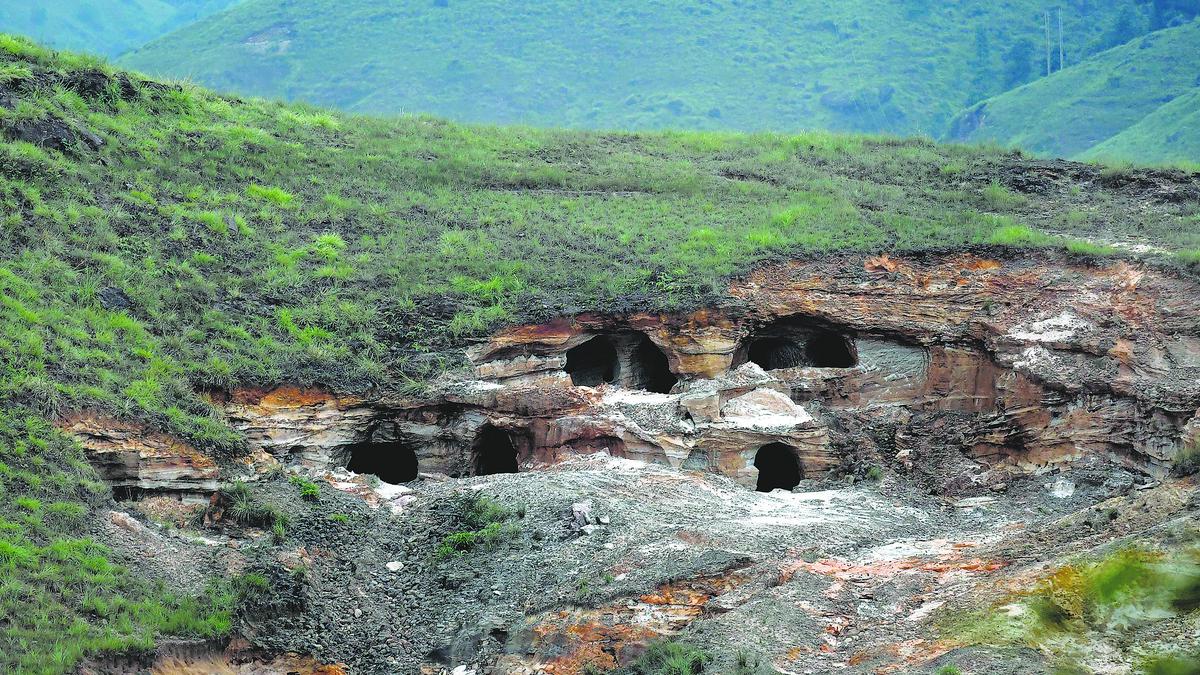Rat-Hole Mining

- 13 May 2024
Why is it in the News?
A one-member panel appointed by the High Court of Meghalaya to handle coal-related issues has flagged the lack of progress in restoring the environment damaged by rat-hole coal mining in the northeastern State.
What is Rat-hole Mining?
- Coal reserves are concentrated in Eastern India, spanning states such as Telangana, Madhya Pradesh, Maharashtra, Jharkhand, Chhattisgarh, and West Bengal, with significant deposits also found in the North-Eastern regions like Assam and Meghalaya.
- However, commercial mining isn't prevalent in the North-East due to unsuitable terrain and the nature of coal deposits.
- Open mining faces additional challenges, and the coal in this region often contains high sulfur content, reducing energy efficiency and classifying it as low-quality coal.
- A rat-hole mine involves digging of very small tunnels, usually only 3-4 feet deep, in which workers, more often children, enter and extract coal.
- Once the pits are dug, miners descend using ropes or bamboo ladders to reach the coal seams.
- The coal is then manually extracted using primitive tools such as pickaxes, shovels, and baskets.
- A major portion of these employees are children, who are preferred because of their thin body shape and ease of accessing depths.
- This practice has become very popular in Meghalaya.
- Here there are majorly hilly terrains, which make coal mining very difficult.
- Also, digging a big hole is very difficult because a big hole demands pillars and support.
- Since it’s a good opportunity to extract coal from there for big as well as local investors, because it involves less investment and good returns, people are drawn towards this dangerous business.
- The practice is to not make any professional tunnels, install pillars, and ensure safety measures, but to just dig a small tunnel and put children and labour to work.
- Rat-hole mining is primarily practised only in Meghalaya.
- Such cases are not witnessed in Jharkhand and Chhattisgarh because the coal seems to be thick in Jharkhand and Chhattisgarh while in Meghalaya coal seems to be very thin.
- So, economically it is not a good idea to do open mining, and therefore, they prefer rat-hole mining.
Types of rat-hole mining:
- The rat-hole mining is broadly of two types.
- In the side-cutting procedure, narrow tunnels are dug on the hill slopes and workers go inside until they find the coal seam.
- In the other type of rat-hole mining, called box-cutting, a rectangular opening is made, varying from 10 to 100 sqm, and through that a vertical pit is dug, 100 to 400 feet deep.
- Once the coal seam is found, rat-hole-sized tunnels are dug horizontally through which workers can extract the coal.
Environmental and Safety Concerns:
- Since rat-hole mining is illegal, it is practised behind closed doors, and therefore, no one is ready to invest in infrastructure development.
- Coal is stored near rivers because of a shortage of space which leads to pollution around water bodies.
- The water in the Kopili River (which flows through Meghalaya and Assam) has turned acidic.
- The entire roadsides in and around mining areas are for piling coal.
- This is a major source of air, water and soil pollution.
- Off-road movement of trucks and other vehicles in the area causes further damage to the ecology of the area.
- Due to rat-hole mining, during the rainy season, water gets flooded into the mining areas resulting in the death of many workers due to suffocation and hunger.
- If water has seeped into the cave, the worker can enter only after the water is pumped out.
- Also, the mines are typically unregulated, lacking safety measures such as proper ventilation, structural support, or safety gear for the workers.
When Was It Banned?
- The National Green Tribunal (NGT) banned rat-hole mining in 2014 and retained the ban in 2015.
- The ban was on grounds of the practice being unscientific and unsafe for workers.
- The NGT order bans not only rat-hole mining but all “unscientific and illegal mining.”
- But orders of the Tribunal have been violated without exception since The State Government has failed to check illegal mining effectively.
